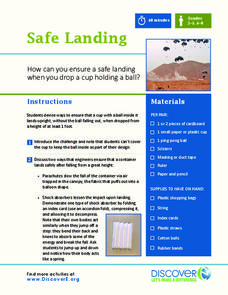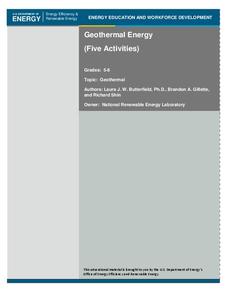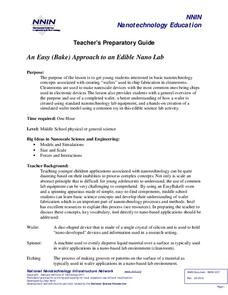Teach Engineering
Super Slinger Engineering Challenge
How well can you launch a ping-pong ball? Small groups design launchers that can launch a ping-pong ball 20 feet into a target. The teams follow the engineering design process as they develop a solution that meets the design...
Teach Engineering
Better By Design
Which modification is the best? Using the scientific method, pairs determine the effects of each control surface on the distance of a glider's flight. The activity, section 16 in a 22-part unit on aviation, allows pupils to gain a better...
Teach Engineering
Energy Storage Derby and Proposal
Small groups use the engineering design process to build and test a vehicle capable of carrying 250 grams a distance of five meters. The design must allow for the storage of potential energy and turn it into motion,...
Teach Engineering
Portable Wheelchair Ramp Challenge
Ramp up the engineering design process in your classroom with an activity that challenges teams to design, build, and test a small-scale portable wheelchair ramp. The class develops design requirements, and teams test their designs...
DiscoverE
Nanomedicine
Cancer patients need as much help as they can get. Future engineers design a system that delivers cancer medicine to the lungs but doesn't harm other organs. Using ferrofluids and iron particles, they test out their delivery systems.
Teach Engineering
Off-Road Wheelchair Challenge
Challenge your class to use their understanding of the engineering design process to design and build a small-scale, off-road prototype for an assistive technology device. Teams select materials to build their scale models, and, using...
Teach Engineering
Earthquakes Living Lab: Designing for Disaster
Build and design to rock and roll. Pairs research building design in earthquake areas and use computer simulations to see the effects of earthquakes on buildings,. They then sketch and explain a building design that would withstand...
DiscoverE
Safe Landing
Watch out below! Future engineers come up with methods to ensure that a ball in a cup stays in the cup even after dropped from a given height. It might be prudent to include some kind of shock absorber in the cup. Parachutes are a good...
DiscoverE
Clean It Up
Water, water, everywhere, but not a drop to drink—until we clean it, of course! Scholars design a filtration device that removes pollutants from water. The goal is to have the water come out as clean as possible from the device. How...
US Department of Energy
Geothermal Energy
With Earth Day quickly approaching, as well as many science fairs, why not challenge your class to investigate geothermal energy or other renewable energy resources? There are five driving questions explored in depth here, as well as...
DiscoverE
Build a Candy Dispenser
Everything in moderation, especially candy. Scholars design and build a dispenser for candy. But, they can't get too carried away—only three or four pieces of candy can come out of the dispenser at one time.
Perkins School for the Blind
Testing the Strength of a Column
Columns have been used throughout the world because they are good load-bearing structures. Learners with visual impairments conduct an experiment to work through the design process as well as to understand this engineering phenomenon....
Teach Engineering
Tools and Equipment (Part 1)
Looking for the best inclined plane for the job? Groups calculate the theoretical mechanical advantage for four different inclined planes. They determine the actual mechanical advantage by measuring the amount of force needed for the...
DiscoverE
Tunnel Meetup
Meet me in the tunnels. Scholars choose a tunnel entrance and mark it on their side of the cardboard. They describe the location to their partners and see if they can guess each other's locations. Punching a hole through the cardboard...
Teach Engineering
Edible Rovers (High School)
Design and build a rover ... then eat it? This activity has groups of two design and build Mars rovers. The teams determine what instruments they want to include with their rover and plan a budget. They calculate the cost of the body of...
Teach Engineering
Inside the DNA
Get your class to take a closer look at DNA. Pupils conduct research to determine the methods used by scientists to analyze the molecular structure of DNA. The class members investigate different types of molecular imaging along with gel...
Teach Engineering
Let's Get it There Fast
Are planes the best shipping method? Using maps, pupils determine the fastest mode of transportation between two cities. Given a list of items to ship, groups decide the best shipping method to finish the 18th segment of a 22-part unit.
Teach Engineering
Sugar Spill!
Sugar isn't good for you, but it's great for yeast! Scholars design an experiment to investigate how variables affect the rate of sugar consumption in yeast. The last installment of a nine-part Life Science unit considers how scientists...
Teach Engineering
Earthquakes Living Lab: FAQs about P Waves, S Waves and More
Let's talk about earthquakes .... Using the Internet, pupils research what causes earthquakes, how scientists measure them, their locations, and their effects. The resource is not only informative, but it also builds crucial...
DiscoverE
Build a Better Boomerang
This isn't the boomerang you're used to. Scholars first see how a commercial boomerang works. They then cut out a four-wing boomerang and test its flight to compare it to that of the commercial boomerang.
DiscoverE
Hold Your Water
Let's hope there are no leaks. Pupils work together in groups to build a device that will keep as much water as possible in a cup. After being dropped from a height of seven feet! Time to haul out the ladder.
Teach Engineering
Building a Barometer
Forget your local meteorologist — build your own barometer and keep track of the weather with an activity that provides directions to build a barometer out of a narrow necked bottle, a glass, and some water. Using their barometer,...
Teach Engineering
Basically Acidic Ink
If you don't want to drink red cabbage juice, here's another use for it—a decoder! Using vinegar and ammonia-based window cleaning liquids as invisible inks, scholars create designs in the second lesson of the series. Red cabbage juice...
National Nanotechnology Infrastructure Network
An Easy (Bake) Approach to an Edible NanoLab
You can make it if you bake it! Young scientists model electronic chip fabrication with an easy bake oven. They create a design to embed in their brownie "chips" and compare their models to wafer production in basic nanotechnology.























